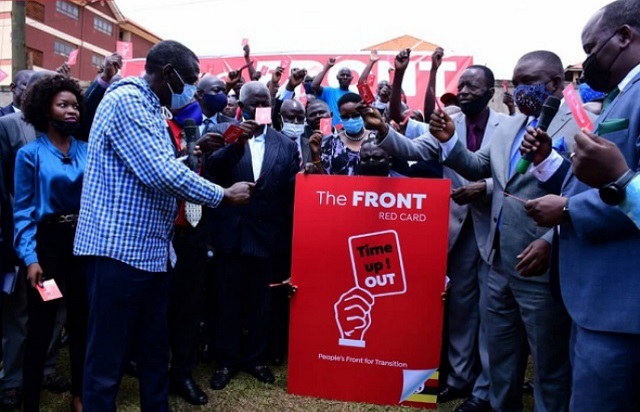
Why Besigye’s struggles are not about democratising Uganda but about making Besigye president
THE LAST WORD | ANDREW M. MWENDA | Opposition leader and activist, Dr Kizza Besigye, has launched a new pressure group, the People’s Front for Transition (PFT). Besigye said the strategic objective of the pressure group is to remove President Yoweri Museveni from power. There is a fundamental problem with Besigye’s view of Uganda and explains his failure to lead his followers to any meaningful outcome. He has defined the problem of Uganda as Museveni, and the solution the removal of the president. Removing Museveni has thus ceased to be a means to an end and has become the end itself.
The reduction of the problem of Uganda to Museveni is a politically appealing cliché to Besigye’s hordes but also delusional. Museveni came topower claiming that the problems of Uganda were Milton Obote and Idi Amin. It is difficult to find a single strategy of governance employed by either men that Museveni has not replicated on a grander scale; tribalism, favouratism, nepotism, militarism, corruption, repression, violence, etc.
Over years of study, I have concluded that these are not governance strategies employed by evil men with malign intentions. They are strategies employed by all leaders in poor countries across time and space. Besigye would best be served by defining a broader strategic goal such as “creating a prosperous and democratic Uganda”. The removal of Museveni would be only a means to such an end. With such a strategic aim, Besigye would realise that it cannot be achieved over a short period of time and in one big blow – the removal of Museveni.
In fact, Museveni’s removal would only create conditions for an improved pace in pursuit of that goal. The problem with democratic development, however, is that it is usually slow, messy and does not follow a continually growing curve. Those who seek it must be willing to dig in for the long-haul, recognising democracy is a journey of continuous improvement, not a destination.
Once democracy and prosperity become the main goal, Besigye would also realise that even if Museveni were not ultimately removed from power, a lot of progress towards a democratic and prosperous Uganda can be realised. This would be done by pressuring him using different tools such as street protests and demonstrations. But protests in and of themselves do not create a political outcome. Protests can seek to remove a government from power or to force negotiations with it. Even when they succeed, they must negotiate a political settlement. And once you enter negotiations, giving concessions and making compromises becomes inevitable.
There are other tools used to promote democratic governance such as petitions and civil suits in court, which Besigye disregards. He does this in large part because he believes in all or none: he can only settle for grabbing power from Museveni and he becomes president – nothing less.
So, Besigye’s struggle is not about democratising Uganda but about making Besigye president. It is an egotistical journey. No wonder many of his comrades have walked away from him.
Protest, negotiation, compromise, civil suits and petitions. Why are these tools vital to democracy? Because a government that comes to power through negotiations and compromise will tend to
rule through negotiations and compromise i.e. it will tend to be democratic. Equally a government that comes to power without any negotiations and any compromises will tend to rule without negotiations and compromises and by crushing its opponents. Such a government will inevitably be intolerant, autocratic and dictatorial. And that is the government Besigye seeks to preside over.
But let us also agree that removing Museveni is an absolute strategic imperative. How then does one define a strategy to achieve this aim?
Besigye is eclectic here. He participated in past elections believing that he could win power that way. But he the elections and lost faith in this strategy. Increasingly, he has turned to mass action – stimulating a popular insurrection along the lines of what happened in Tunisia, Egypt, and most recently Sudan. Nowadays, he participates in elections only to create conditions for insurrection. Whether through elections or insurrection, Besigye’s strategy is poor.
If the strategic aim is to remove Museveni, how should one proceed? Besigye’s mass campaign whether for elections or insurrection is based in Kampala and its surrounding district of Wakiso and nearby Mukono. This is understandable for both election and insurrection. For elections, this area has the highest concentration of anti-Museveni feeling. Besigye gunners a lot of votes. For insurrection, Kampala forms the center of gravity. If one paralysed it, they can precipitate governmental collapse.
But in strategy, one must know themselves first and also know the enemy well. Let us begin with elections, which are the foundation of a democratic order that Besigye claims to seek. The presidency is the most fortified position where Museveni has concentrated his resources. The opposition is weak numerically and in terms of tools of force. Museveni, on the other hand, has the state and its financial and military resources. Given the balance of forces, the best strategy for the opposition would be one of exhaustion – wearing the enemy down through small, isolated battles and skirmishes on multiple fronts across remote parts of the country, forcing him to spread and therefore dilute his resources.
Yet Besigye has consistently adopted a strategy of annihilation where he confronts Museveni in head-to-head direct combat on the streets of Kampala and at the ballot box. This means he expends his meagre resources to attack the enemy’s most fortified position where the balance of forces favour Museveni. This is a suicidal strategy. For both elections and insurrection, it leaves Museveni strong in most of the country and therefore free to concentrate his security forces in Kampala alone in a decisive battle. Besigye must be a student of Carl von Clausewitz on decisive battles. He needs to read Sun Tzu on how to wear down a strong enemy; he is an Achilles (strong) yet he needs to be an Odysseus (clever).
In essence, Besigye has always had a plan but not a strategy. A plan supposes a sequence of events that allows one to move from one state of affairs to another. A strategy, on the other hand, anticipates obstacles along the way and maneuver by others to frustrate one’s plan because they have conflicting or competing interests and concerns. At the core of a strategy is a clear definition of the main aim and an assessment of the means available to you to realise that objective.
****
amwenda@independent.co.ug
 The Independent Uganda: You get the Truth we Pay the Price
The Independent Uganda: You get the Truth we Pay the Price




but u mwenda very well know that some tools like demonstrations cant work here in uganda, u try it , u know what follows, is that therefore what u fancy?
u fancy demonstrations? do u know its ramifications, mwenda please
Most times I have wonderd why the New Vision removed the cartoons of Ekanya from their pages. In one episode ekanya pulls a gun and the victim asks him ‘then what?’. This I think is the trajectory that Ugandan political discussion has taken. Museveni’s continuous stay in power doesn’tmake.him.stronger and any attack from the opposition however punny dents the invincibility that you spin around him. Don’t forget that Besigye was a decorated hero long before we all thought politics got uglier the more you played it. I recall how it sounded when the good cadre called his master a liar. Today social media is full of inside stories so scandalous that the lies and the facts are at the desecration of the listener. The doctor may be wrong on strategy but he has done his part.
When museveni’s time is over and gone, how will you realign your article or writing when there is a New president. Change is inevitable, don’t write articles that suppress those who are trying to bring change, apart from praising your master, what else have you contributed to Uganda’s well being.
1.Besides Countries in Southern Africa and stable nations in West Africa like Nigeria,Ghana and Senegal Most governments in Africa are toppled through Coups. When it comes to Democracy; Uganda is still due for a case study;What do i mean;She is a bit unique because she practices half democracy and deploys militarism only when necessary and it works.
2. I was surprised that KB was a normal person. When Bobi Wine took his political space he took a back seat and observed Bobi Wine carefully and realized that NUP was just a scarecrow.